
Olivia Reeves is an Olympic gold medalist. Let’s just get that out of the way up top here before we dive into her self-deprecating sense of humor and mistrust of her athletic skills.
Easing into the interview from her home in Chattanooga, Tennessee, she answered a question about her family and immediately pushed down on the yoke, which set her self-esteem into a nose-dive.
“I’m not even the best athlete in my family,” she says, laughing and squirming a bit in her chair. “You wouldn’t want to pick me for your dodgeball team. I know that.”
After awarding her sister Haley the gold star for best family athlete, she concedes her other sister, Caroline — while not as well known for her athletic endeavors — isn’t so bad, either.
When challenged on her certainty of the pecking order, she relayed a story from her short-lived flirtation with basketball many years back, sharing that her friends always lamented, “Let’s get Olivia the ball at least once so she gets a shot.”
She offered a shrug and a smile.
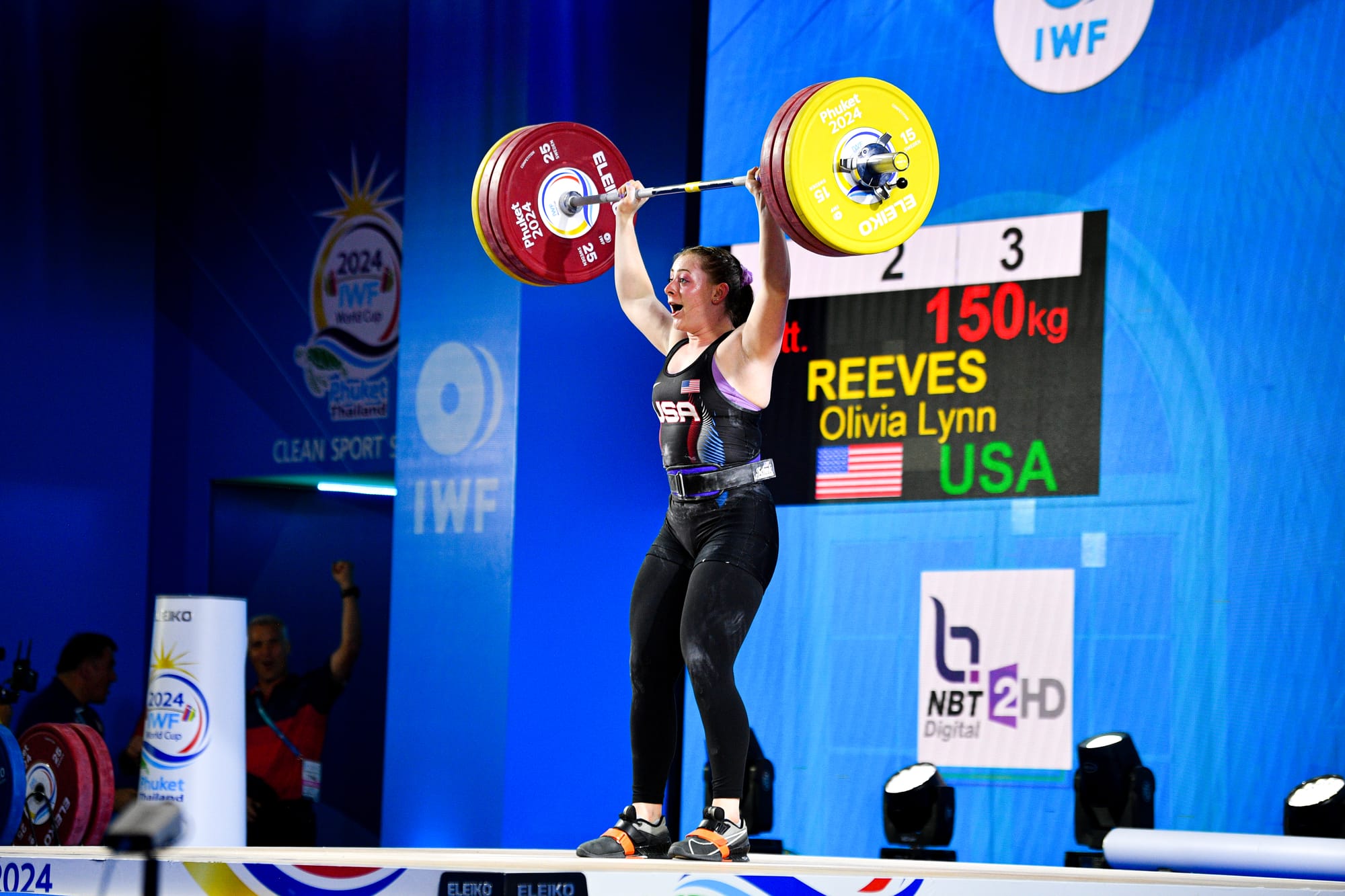
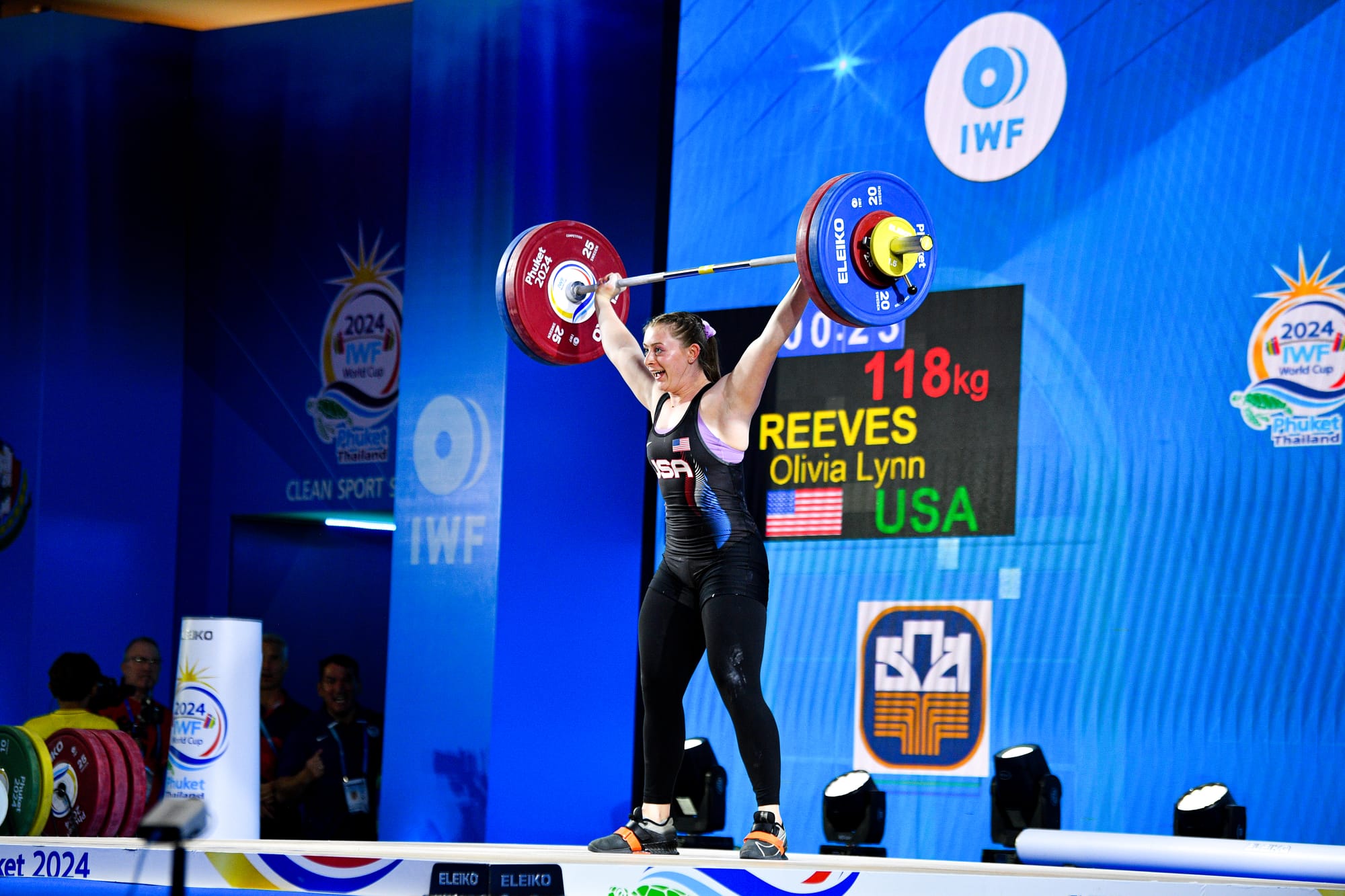
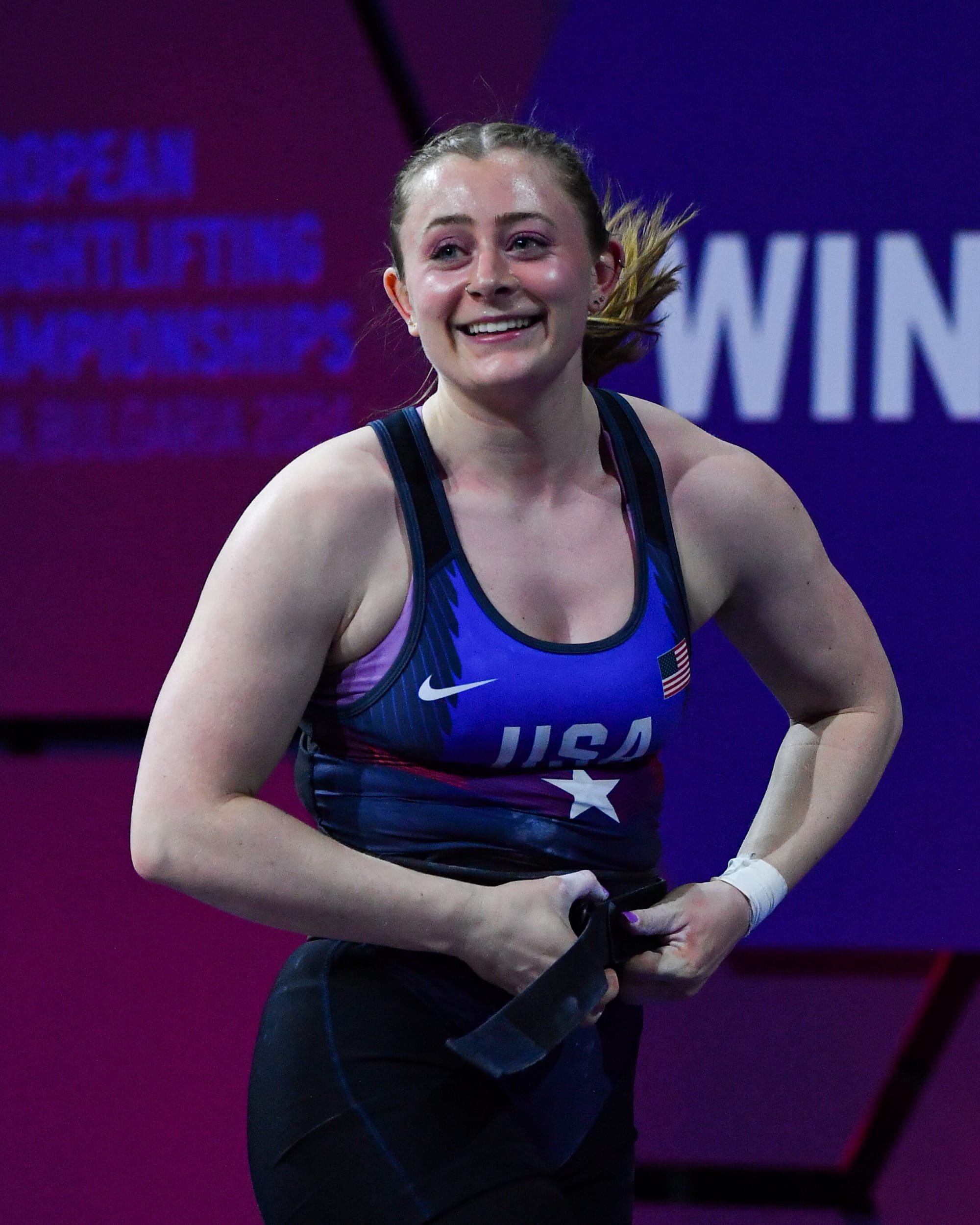
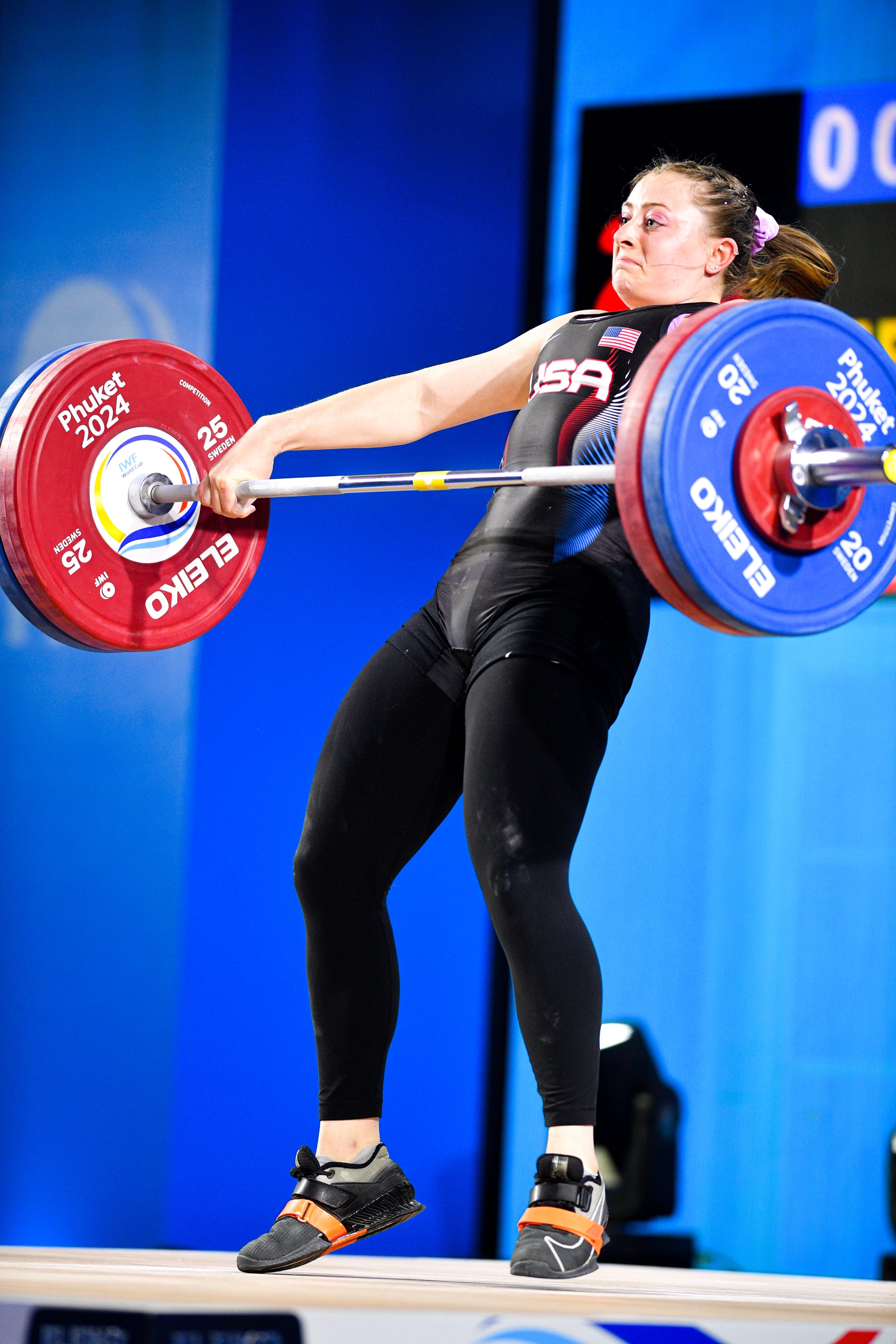
As the Olympic qualifying process came to an end, Olivia had a good indication a podium was waiting for her in Paris. [Courtesy photos]
“I just wasn’t very good.”
Well … she who laughs last laughs best.
The young teen would find her sporting lobster courtesy of a Cross-Fit studio her parents owned for nine years. There, under the structure of Cross-Fit for Kids and Cross-Fit for Teens, she developed the early signs of a competitive edge, seeking to best the kids in her immediate age group, before venturing out into the world of competitions and events where she could measure her talents on a wider scale.
This all started around 2012. Within three years, she found herself not only drawn to Olympic weightlifting but training with an eye on a specific prize. In September of 2015, she joined forces with coach Steve Fauer. Just months later, when the calendar flipped to 2016, she found herself at an event vying for a spot in the U.S. National Championships.
She earned that berth but wasn’t all that impressed by her accomplishment. Which is how she seems to approach most things in her life — something comes her way and she knocks it down with composure and a fierce mindset.
“We qualified and Nationals seemed like a big deal, I guess. And then you go there and you're like, okayyyy,” she says nonchalantly. “And after Nationals — I ended up taking second place in the 48-kilo weight class — I was invited to a training camp at the Olympic Training Center.”
From placated basketball teammate to the OTC in a fairly truncated window of time?
Not a big deal.
Fast forward a bit. The 2016 Rio Olympic Summer Games were set to begin, and Olivia found herself in Colorado Springs, Colorado, at the Olympic Training Center along with others potential-bearing souls USA Weightlifting had identified.
"We got to go to the dorms and see where the Olympians who were heading to Rio lived and where they trained and who they trained with,” Olivia says.
“I’m at this camp and I’m getting to train with people and touch the same bar as Olympians. It was crazy. And then you go home and you get to watch. I got to watch the 2016 Olympics and look for those people. And that is where it was like, legit. It’s not just some sport or hobby of mine. I really enjoyed it and I wanted to see how good I could be.”
Still a noob in her middle teens, the 2020 Tokyo Olympics weren’t an option. But the why — the reason — was clearer than ever. A defined goal, a set of metrics to strive for and a little something to prove to herself.
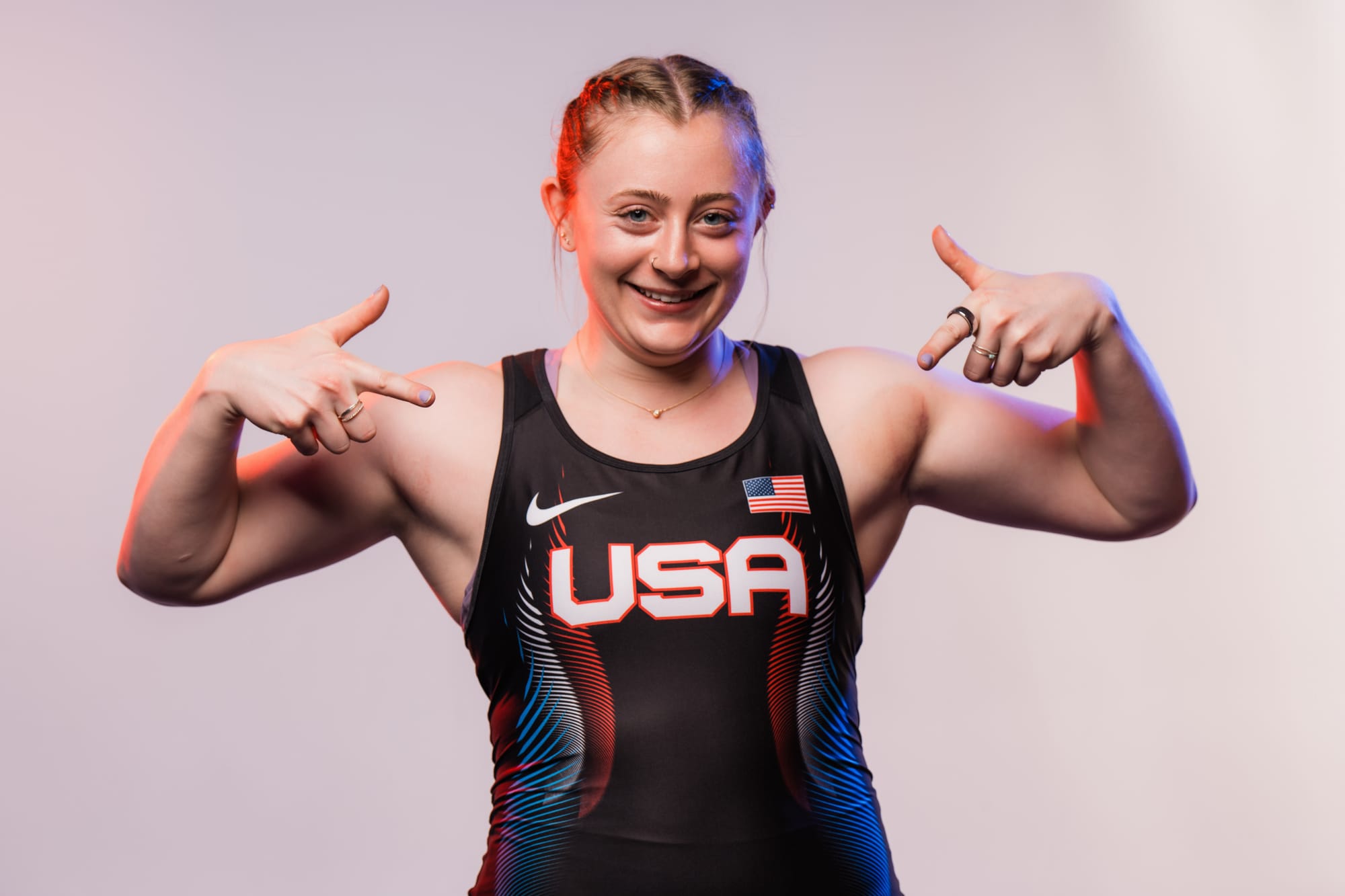
“Monday, Tuesday, Wednesday, Friday I go to the gym. I’ve been doing that for nine years. I don’t really see another option. My coach is older, so the routine is a little old school, I’d say. For two of those hours I’m in the gym, I’m lifting. I don’t do a whole lot of accessory work. I do the Olympic lifts each session,” Olivia says.
Olivia added she never knows what she’ll be doing for each session, but it typically involves power snatch variations, a clean and jerk variation, back squats, front squats — it’s dependent on the competition cycle.
“It’s what he wants to get out of me that day, whether we’re working on technique or we need to go with a heavy single. And then there’s recovery that comes with that. That’s why when I say I’m not a great athlete, weightlifting makes you really explosive. But I wouldn’t say I’m training to be explosive in anything other than the Olympic lifts.”
Her first realistic shot at making the Olympic team was Paris 2024. The quest began in December of 2022. Seven competitions would make or break each athlete’s burning desire to represent Team USA. Olivia described the rankings throughout the year as a sea-saw. Back and forth they went, with different athletes at various intervals looking more likely than not to earn a ticket to France.
At these events, she was competing against the world’s top lifters. A nuance in that scenario is she was also working to beat teammates, including the 2021 Tokyo silver medalist in her weight class, Kate Vibert.
“It’s not her first rodeo,” Olivia says. “Obviously, it felt like mine. It felt very intimidating for the first couple of competitions.”
At the 2023 World Championships in Saudi Arabia, Olivia broke through, setting a junior world record.
“I hit my pace after that and it was starting to look like I was building off the momentum in each competition. I went six for six (podiums) and I felt like I could do a couple more kilos. Every time, going into it, I was not really expecting to do more, but just expecting to have a good day. I think that helped my overall outlook going into the Olympics until Thailand.”
Thailand. The final Olympic qualifier.

The energy and electricity and anxiety are palpable amongst the world’s lifting community. There was something on the line that everyone had trained relentlessly to reach.
The favorites — almost always it seems — were China and North Korea. With North Korea ineligible for the Olympics due to sanctions, all eyes were on the Chinese as the benchmark group of heavies.
Olivia beat them both.
“Then it was like, wait a minute. Not only am I going to the Olympics, but the possibility of medaling now is very likely. Having beaten China opens the doors to the podium for any country.
“Nobody beats China. It was so surreal. A lot of people said the gold medal was actually won in Thailand. That was such a defining moment in my confidence in my career and as well as other things … just … yeah, I don't think I realized the weight of that.”
The crowning moment for Olivia was on the horizon. Time bled slowly; she left the U.S. on July 17 and the weightlifting events didn’t start until August 7. Her turn to churn seven years of promise into a historic gold medal came two days later.
Pressure was something she knew plenty about, but Olympics pressure and the burden of expectations felt suffocating during more than two weeks of idling in the Athlete Village. She would see others compete, exhale and have the time of their lives as the Games carried forward. For Olivia, that release would have to wait as the anxiety and nerves and butterflies built a dam of pent-up emotions deep within her.
“I got a little claustrophobic. I just wanted to go and compete. I wouldn’t say I had my best day at the Olympics. I had a good enough day. But leading up to it, my training was not amazing.”
Olivia felt four thick walls laden with expectations closing in as the days crawled by.
“There were a lot of tears and also, I think just normal pressure of, this is my first Olympics and people want to ask me, ‘What's it like? You're the favorite. How's it feel?’ Because I am the favorite and it's like, ‘Okay, well, I still have to compete on that day and show up the same as I would for any competition.’”
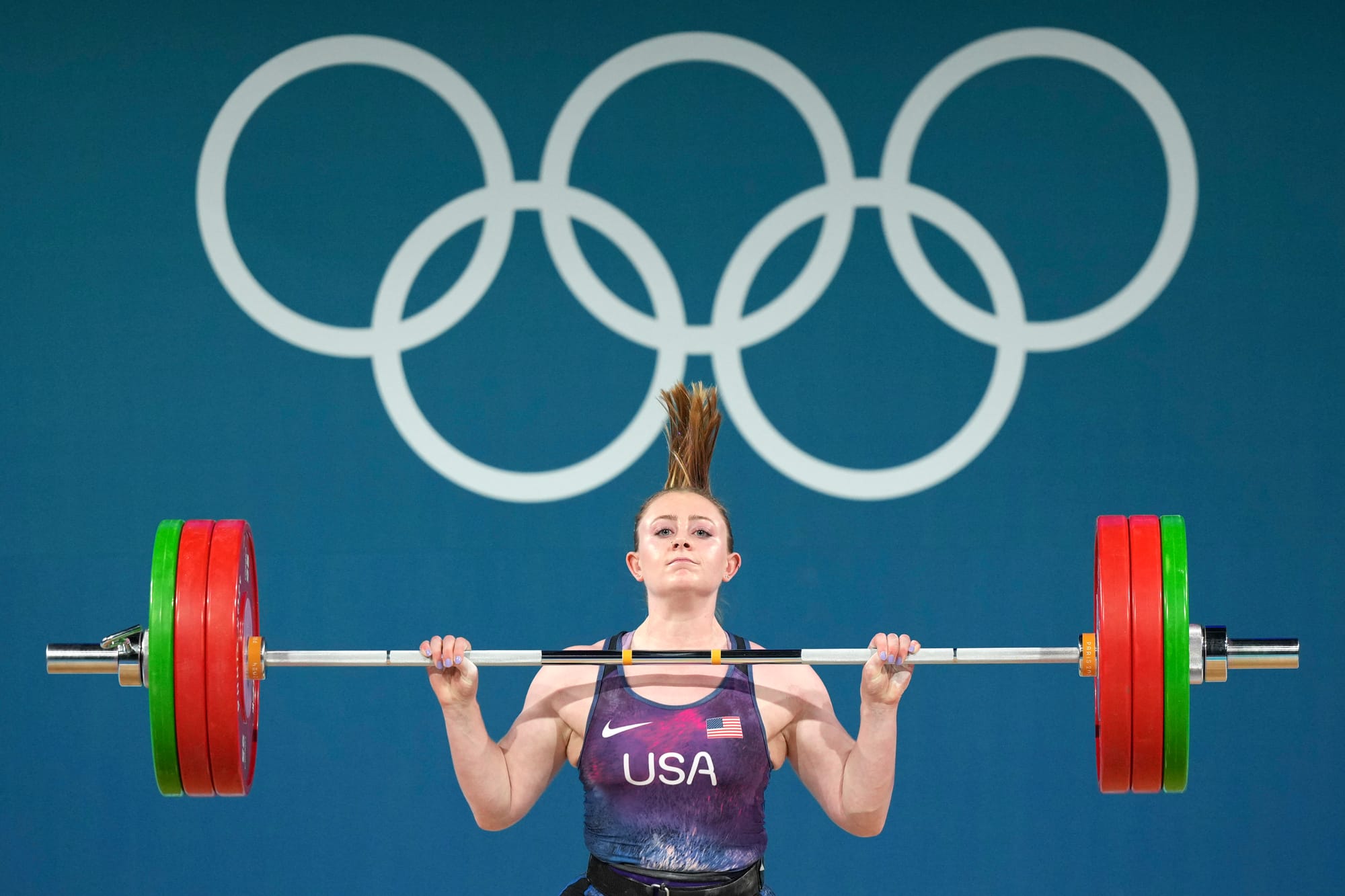
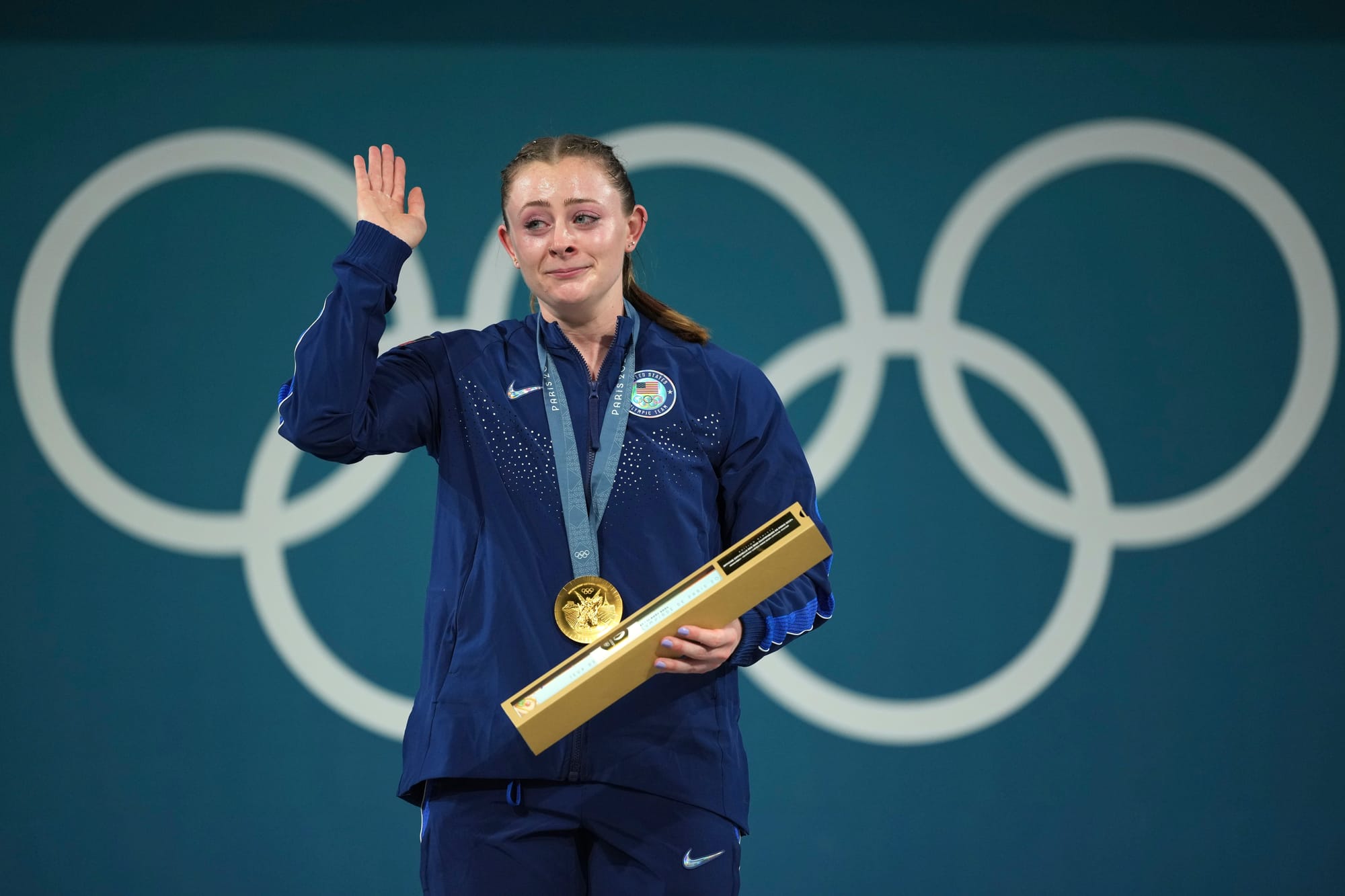
Although she says it wasn't her best day of competition, winning gold still brought the feels on the podium. [AP photos]
People who had watched her compete for years began making comments about how different she looked, and how her presence seemed off. Then, when her day arrived, warmups didn’t go well.
"I felt very scared to be up there and be like, ‘This is what I've done. This is the expectation I've set for myself, and I don't think I'm going to meet that today.’ How do I keep going and do another lift when I'm not quite sure that the last one wasn't very good? But you just have to keep going.”
Keep going she did. She broke free of those heavy walls and brought home the first U.S. weightlifting gold medal in 24 years. She predicted she would cry on the podium, and cry she did. And why not? The emotional release of living out your dream while representing your country … that’s not nothing.
Olivia confessed her homecoming to Tennessee was a little chaotic — now she is a big deal — but life returned to normal in short order. She’s studying sociology with an eye on a master’s degree. She’s training again, with Los Angeles 2028 a long-term objective.
She enjoys spending time with her pit bull-mix rescue dog, Amber. She’s embraced the sourdough-baking mania running rampant on social media. Laughing, she added she also likes plants.
The Olympic gold medalist who doesn’t consider herself much of an athlete has a platform now, as medalists do. And with that comes a responsibility to use it wisely. She wants to use her megaphone to empower female athletes and has a message for those looking for encouragement.
“Like, why not? Why not me? What I often think about is when teachers would be coming to the classroom and say, ‘I need eight strong boys to come and help me lift these chairs and move whatever.’ And it's like, ‘Wait a minute, but I can do it,’” she says, raising her hand as if she were still a young girl in the classroom.
“I'm strong as hell. Why not include women in that conversation of strength? And I think that's such an empowering thing for me to not be bogged down by looking muscular or anything like that. And I just hope that what people take away is you can redefine the word feminine, you can redefine the word woman.”
The Scotland Project, the debut novel from Matthew Fults, is available now from your favorite bookseller.
